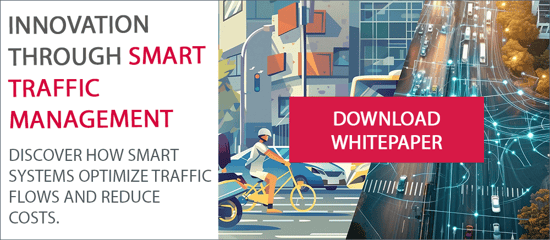How can road traffic be managed so that there is as little congestion as possible? And how can local public transport be optimally adapted to the needs of citizens? How will the new construction site affect both areas? Can the service life of the dilapidated railroad overpass be extended? And who will ensure that parcel service providers and local industrial companies are not unduly affected? Smart Mobility - a data-based, intelligent traffic control system - brings these and other tasks under one roof. This makes the complex challenges for cities and municipalities manageable.
The key requirements for urban mobility are easy to name. It should be efficient, sustainable and safe. But what does that mean in practice? For example, that people get to their destination quickly and are not slowed down by traffic jams or long transfer times. That road users have a climate-friendly and reliable alternative to motorized private transport based on combustion engines that does not disqualify itself due to various restrictions. And that the costs for passenger traffic, but also for transportation and logistics, do not increase excessively.
Unfortunately, the reality is often quite different: dilapidated infrastructure, roadworks, accidents, closures, inadequate mobility concepts and environmental pollution caused by particulate matter and emissions dominate discussions about transportation. In addition, inefficient interaction between different modes of transport not only leads to time losses and frustration, but also to considerable costs for the economy and the public sector.
They have an impact on supply chains and transport flows, cause enormous economic damage and, last but not least, significantly reduce the quality of life for all of us. According to the INRIX Traffic Scorecard, the average commuter in Germany spent a total of 43 hours in traffic jams in 2024 alone - together with delivery traffic.
Data-based platforms as a way out
The solution lies in networked and intelligent traffic control. This could significantly reduce such problems. The aim of smart traffic management is to optimize traffic flow, increase comfort and safety and reduce environmental pollution through the use of existing, continuously developing and increasingly affordable technologies.
Modern technological approaches such as the Internet of Things (IoT) and machine learning provide an important building block. Various types of stationary and mobile sensors and traffic cameras continuously collect real-time data on traffic flows and road conditions. Further data is provided by smart street lighting, weather stations, satellite systems for navigation, communication and earth observation as well as digital applications and platforms for passenger traffic, transportation and logistics. Not forgetting digital citizen participation, for example when road damage, obstacles and danger spots are reported via municipal apps.
All this data needs to be brought together, analyzed and made available. Well-coordinated data integration will also lead to significant improvements in traffic management. However, this requires not only technological solutions, but also close cooperation between different players.
However, efficient smart traffic management also offers significant added value. Automated control systems enable an immediate response to changing traffic conditions. Adaptive traffic control systems can, for example, change traffic light circuits, signal systems and other control systems in real time in order to optimize traffic flow and minimize congestion, direct heavy goods traffic on and around bridges in need of renovation, but also to clear the way for emergency vehicles from the police and fire department and ambulances or to show their drivers faster routes.
More quality in transport planning
Mobile application and movement data and the integration of booking systems can also be used to draw conclusions about demand. The analysis of these large volumes of data using machine learning makes it possible to predict traffic flows and recognize patterns. This predictive analysis is a powerful tool for traffic planning and control, as it helps to identify potential bottlenecks at an early stage and take measures to relieve them, as well as to coordinate mobility and transport offers across different modes of transport in a more targeted and better way and to provide them in a complementary manner.
Visualizations and dashboards or cockpits make the collected and analysed data accessible and usable for decision-makers. Such tools enable well-founded and rapid decision-making based on up-to-date and accurate information. This applies to control centers at traffic and police authorities, for example, but can also be of interest to dispatchers in the transport and logistics sector.
Challenging implementation
The advantages of smart traffic management are obvious. However, getting there is not easy - there are technical, legal and organizational challenges to overcome. The implementation and maintenance of the underlying systems often require considerable technological and infrastructural investment and coordination, but can be easily mastered with a modular approach.
Data protection and cyber security are important issues that need to be considered in order to ensure public acceptance of these technologies. The question of ownership and the type of data provision must also be clarified and business models established that offer incentives for opening up the necessary data sources.
Last but not least, transparent political and bureaucratic decision-making processes must be planned and citizens and other "users" must be involved with their needs, opinions and ideas.
With its comprehensive expertise, EDAG Production Solutions (EDAG PS) offers technical, strategic and organizational support. Whether it's designing a modular solution architecture, adapting and implementing a digital ecosystem with an integrated data platform, dashboard and AI-based analysis and process control, designing and programming your own web and mobile applications, taking over or supporting project management and providing IT resources, hosting, operation and support, employee training and change management.

Would you also like to find out more about the potential of digitally optimized traffic management? Then talk to our expert Nico Marzian, Project Manager & Business Development Manager Smart City & Smart Infrastructure. He can also advise you on options for other smart city topics, such as waste management (Smart Waste Management), municipal water management (Smart Water Management) and traditional and new forms of agriculture (Smart Farming). Or download our white paper "Smart Traffic Management helps commuters and businesses alike" here, which highlights the possibilities of intelligent traffic management and also presents other practical applications.






